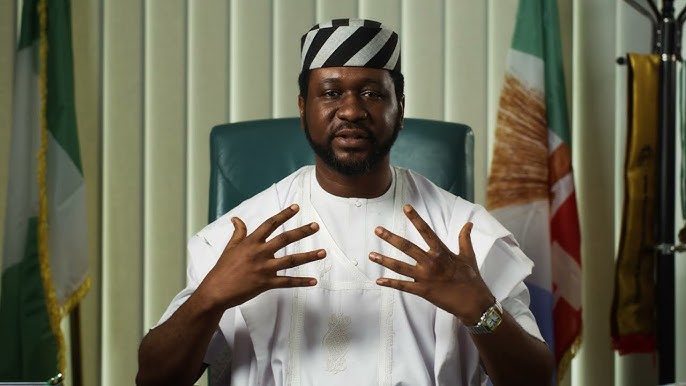You recently held a stakeholders’ forum where you debuted a documentary highlighting the effects of climate change on the clashes between farmers and herders. What was the purpose of this initiative?
We convoked a stakeholder engagement a few days ago to premiere a documentary called “Behind the Valley.” Behind the valley because, Benue as you know, lies within the valley. When we say Behind the Valley, we mean what are the issues that are going on where people don’t see every day on some of the crisis, and the conflicts going on in Benue. So, we came up with this initiative to showcase the challenges that are being faced by our people, showcase the challenges being faced by farmers across Benue and North central as a whole and ultimately, attract support and funding from international and local communities towards ameliorating the IDP issues, empowering the people on modern agricultural practices, climate smart agriculture and better homes where they can start their new lives.
Of course we talked about capacity building, peace building and engagement between farmers and herders and traditional rulers and community leaders to see how we can bring the issue of farmer-herder crisis to be the thing of the past.
So, the event a few days ago was to launch this documentary, present the concept note which we did, and it got very good reviews. It was well attended and already we have partnerships and calls from several development organisations which have shown interest in collaborating with my office and to see that we can implement this programme and take this message to the international community at the upcoming United Nations General Assembly and the upcoming climate conference in Azerbaijan later this year.
While your proposals primarily focus on long-term solutions, what immediate steps do you believe can be taken to address the herders-farmers crisis?
I think one of the immediate things that the government needs to do is a mediation between the farmers and the herders in the country. Of course, to improve security and protection for farmers so they can return to their farms. Security is very paramount in achieving these things, but we decided to look at it a lot from the humanitarian perspective and the displaced person’s angle. Because when we did a survey of the situation, we found out that over 100,000 people have been displaced so far just in the last one year in Benue and statistics show that over two million people have been displaced across the country due to farmers-herders’ conflicts.
So, one of the areas that I decided to look at the issue is how do we help these displaced people to be resettled back to their communities and then go back to their farming activities with more security cover. We are engaging with the state governments and the federal government. We have recently engaged with the Nigerian Immigration Service in Benue to set up a command at the border between Nigeria and Cameroon because if you look at the Cameroon border in Benue State, there is no border post, there is no Immigration, there is no security present. The next border post from Benue is in Adamawa State which is over 2,000 kilometers.
So, there is a wide range of space where there is absolutely no security. So, the herders, the bandits and traffickers and all kind of people have an easy flow into these farming communities and cause the destruction that we are witnessing. We are appealing and engaging with the relevant government agencies to take security seriously to help resettle our people back into their farmland so that in the next one- or two-years people can return to their farms and begin to farm.
How do you intend to go about your plan to attract $150 million support for the displaced?
We are discussing with the Global Environment Fund. We are discussing with the Global Climate Fund under the United Nations. We are discussing with the Development Bank of Nigeria, the African Development Bank; we are discussing with the Nigerian government, and we intend to take this message to the international community to the donor agencies across the world to see how they can intervene in the challenges that we are facing as a result of climate change, leading to the herders-farmers conflict.
Already, we have some commitments from several partners who are working directly with us and already they have booked us to screen the documentary at some of the upcoming international, engagements, international conferences where most of the global donors and partners will be present. So, we hope that we can attract this international funding, and we can also call the attention even from the federal government to see our concept notes as a viable mechanism towards achieving the objective of the federal government in reducing the farmers-herders conflict in Nigeria.
Our target is $150 million. It could be more because the problem is far greater than even that amount, but we intend to start small, one home at a time. We want to build these green homes to resettle people, we want to train them and integrate them back into the communities. So, we will start with one IDP camp at a time, we will start building one home at a time.
So, for states and local governments that are interested in partnering with us and can provide available land where we can build homes for displaced persons and re-train them and reintegrate them into the society, we are willing and available to cooperate. We are hoping that by the first quarter of next year we would have begun to attract some of the funding that we are anticipating so that we can start the work along the stakeholders and to achieve the goal of our concept note.
At the stakeholder’s engagement most of them were unanimous, blaming the farmer-herder crisis on climate change but others believe that is is a calculated attempt by the predominantly Muslim Fulanis to take over; like a Jihad against the Christians in the North-central. What is your take on this?
When you look at the problem from a narrow prism, from the angle of the immediate situation on ground between the farmers and the herders; you can call it a genocide, an invasion, unprovoked killings of our people. But when you broaden your scope, you broaden out your scope a little bit you find out that the problem is more than just a narrow problem of genocide. It’s a broader problem. Why the sudden genocide?
Obviously, from our studies we found that it is a struggle for land and for water. It is an economic war being waged by the like you mentioned the predominantly Fulani herders to grab land and to grab water for their own sustenance and the sustenance of their livestock. When we took a holistic study of the problem, we found that the problem is not just about the genocide happening on ground, it is a problem of climate change. Then we looked at the problem of the desertification in the north, how has this also contributed towards pushing herders to be displaced and to move southwards in search for greener pastures and the issue of banditry and cattle rustling up north.











